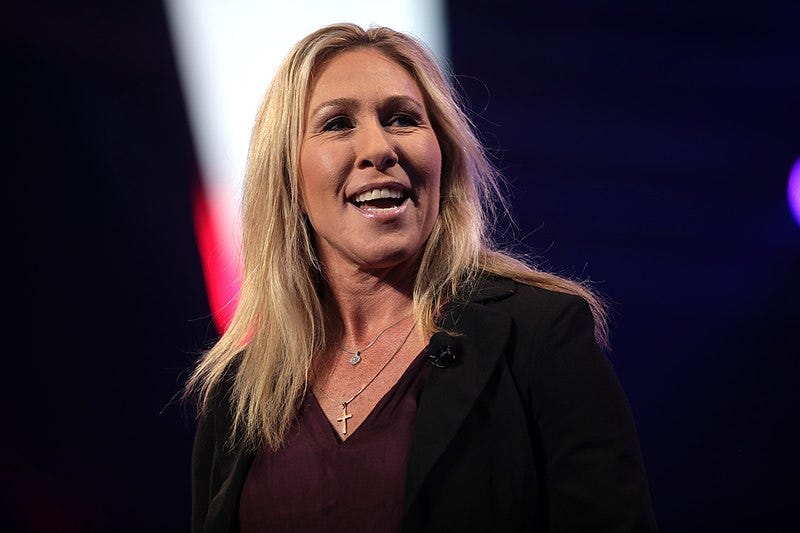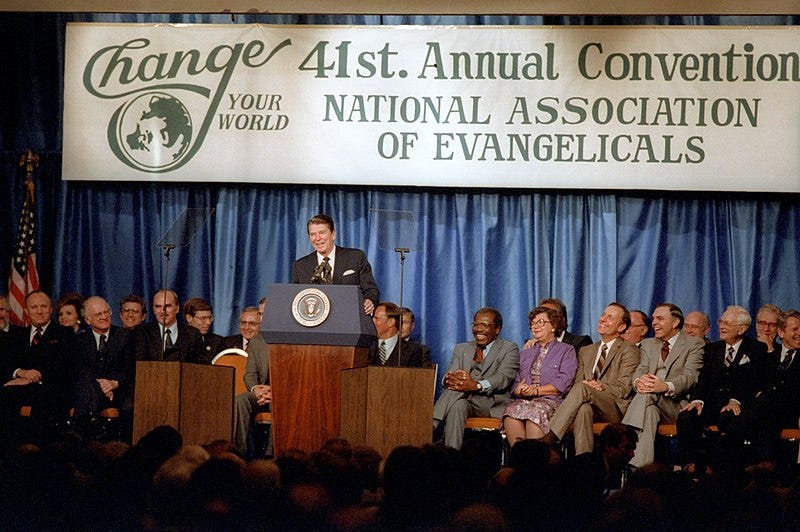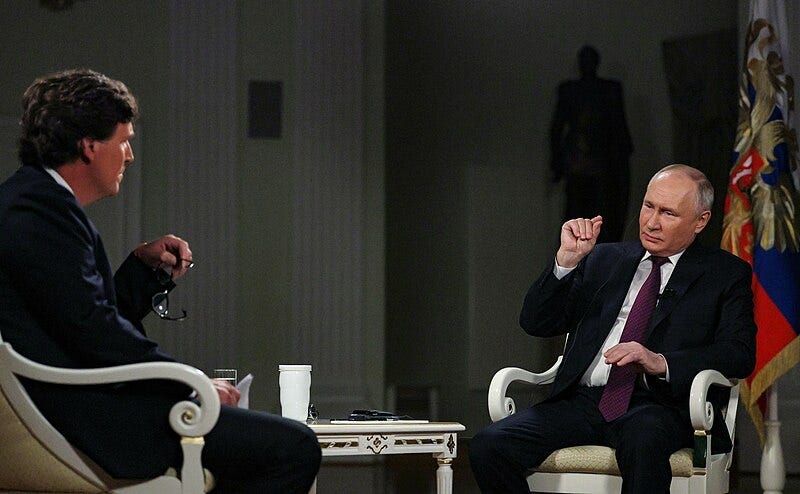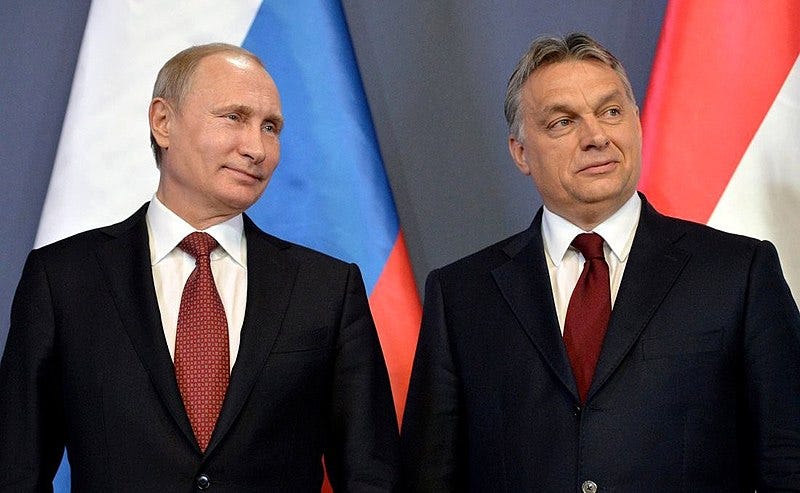Putin's God-fearing fan club
The Christian nationalist embrace of authoritarianism at home and abroad

In July 1956, President Dwight D. Eisenhower signed a bill which designated “In God we trust” as the United States’ official national motto. The words were to be printed on all denominations of U.S. paper currency, and they would find their way onto everything from state symbols to monuments to license plates in the decades that followed. Two years earlier, Eisenhower added the words “under God” to the American Pledge of Allegiance.
With the Cold War well underway, Eisenhower said he believed “under God” should be in the Pledge because it was important to “strengthen those spiritual weapons which forever will be our country’s most powerful resource in peace and war.” When Florida Rep. Charles Edward Bennett introduced the bill that declared “In God we trust” the national motto, he invoked the confrontation with the Soviet Union: “In these days when imperialistic and materialistic communism seeks to attack and destroy freedom, we should continually look for ways to strengthen the foundations of our freedom.” One of those foundations, according to Bennett, Eisenhower, and many other American politicians, was belief in God.
This theme would resonate throughout the Cold War — President Ronald Reagan often presented the clash with Moscow in religious terms. When he branded the Soviet Union an “evil empire” in 1983, he was speaking to the National Association of Evangelicals.
A new era of great power politics has revived the notion of global religious conflict. Just as many American political leaders presented the conflict between the West and the Soviet Union as a battle between Christian civilization and godless communism, many have updated this framing for the confrontation between the United States and China today.

President Trump made hostility to China a unifying theme of his 2016 campaign and launched a trade war with Beijing soon after he took office. In a 2018 speech, Vice President Mike Pence condemned the “avowedly atheist Communist Party” in Beijing and declared that the CCP was “tearing down crosses, burning Bibles, and imprisoning believers.” Then-Secretary of State Mike Pompeo often attacked China in similar terms. China hawks also rightly point to the massive human rights abuses against the Uyghurs and other religious and ethnic minorities.
But what about Russia, the country that was once viewed as the greatest threat to the free world by Republican leaders like Eisenhower and Reagan?
Bashing godless China is good politics for the GOP, but the religious conflict narrative breaks down when it comes to Russia’s war in Ukraine. Vladimir Putin has spent many years diligently crafting an image of his regime as a guardian of traditional Christian values in contrast to what he argues is an epidemic of moral decay in the West. Although the war in Ukraine is the most direct conflict between the values of the liberal democratic West and authoritarianism, many of the figures who shout the loudest about confronting Beijing suddenly lose their voices when it comes to standing up to Russia and defending Ukraine.
When a Chinese balloon floated across the United States in early 2023, many Republicans were whipped into a fearmongering frenzy. For example, Georgia Rep. Marjorie Taylor Greene declared that the balloon was able to “gather intel from all our military bases, our food factories, our cities, our critical infrastructure.” She even carried a balloon around the Capitol to protest the Biden administration’s response to what she regarded as a dire national security threat. But on the subject of Russia’s war in Ukraine, Greene is critical of the Biden administration for the opposite reason — she believes the United States should submit to Putin’s demands and abandon Kyiv.
Over the past several months, House Speaker Mike Johnson refused to bring a bill authorizing desperately-needed military aid to Ukraine to the floor. In February, after Democrats struck an immigration deal in exchange for Ukraine aid, Trump intervened to pressure Republicans into opposing the bill. Johnson’s speakership has always been under threat from the right wing of his conference, and it looked like the Ukraine bill wouldn’t go anywhere. But earlier this month, Johnson suddenly decided that he would bring Ukraine aid up for a vote after all, and it promptly passed with broad bipartisan support. Greene is leading the effort to oust Johnson as Speaker — she filed a motion to vacate on May 8, which was promptly and overwhelmingly defeated — and she described his support for the aid as a “betrayal,” along with other right-wing Republicans such as Kentucky Rep. Thomas Massie.
The belief that Russia is defending Christians while Ukraine is repressing them has become a fixation on the MAGA right.
The New York Times reports that Johnson was partly convinced to stop obstructing the aid to Kyiv by a conversation with Volodymyr Zelensky, in which the Ukrainian president told him about the “magnitude of the misery Russian forces have unleashed across the embattled nation.” The article continues: “All of it tugged at Mr. Johnson’s sense of Christian faith.” There’s no doubt that some members of Congress have been inspired by their faith to assist Ukraine, just as many believed resisting the Soviet Union was a way to defend Christianity.
But for many “Christian nationalists” like Greene, a warped and conspiratorial form of religious sectarianism is an excuse to side with Putin over Zelensky. In a recent appearance on the “proud Christian nationalist” Steve Bannon’s podcast, she said: “Let’s talk about what this really is, Steve: This is a war on Christianity. The Ukrainian government is attacking Christians; the Ukrainian government is executing priests. Russia is not doing that; they’re not attacking Christianity. As a matter of fact, they seem to be protecting it.”
The belief that Russia is defending Christians while Ukraine is repressing them has become a fixation on the MAGA right — the conspiracy theorist Candace Owens, for instance, condemns what she imagines to be “Zelensky’s Christian and ethnic cleansing of Ukraine.” Tucker Carlson constantly complains about the “persecuted Christians in Ukraine.”
The idea that Putin’s Russia is a protector of Christianity is obscene. Shortly after the war began, the Ukrainian Orthodox Church broke with the Russian Orthodox Church (and centuries of tradition) as a response to Patriarch Kirill I’s blessing of the invasion. Russian occupation authorities have gone after disfavored Christian groups, especially Baptists and other Protestant evangelicals, who are suspected of spying for the United States. Evangelical Christians have been kidnapped, tortured, and murdered in eastern Ukraine. Entire congregations have been targeted. Russian forces have destroyed hundreds of churches and killed thousands of Christians — Russian and Ukrainian Orthodox included.
Beyond the spectacle of a sitting member of Congress regurgitating such naked Russian propaganda, Greene’s pro-Putin outburst is indicative of an alarming trend on the right: not just isolationism, but active support for Russia.

There are plenty of conservative thinkers on hand to provide intellectual ballast for pro-Putin propaganda among Christian nationalists. The anti-woke author and psychologist Jordan Peterson is among the most influential public intellectuals in the world, and he argues that the West can only survive if it returns to Judeo-Christian narratives, traditions, and values. Peterson believes the war in Ukraine is a proxy for what he describes as a broader “civil war in the West” — the forces of wokeness in the United States and Europe against the Christian civilization of Putin’s Russia.1
Peterson blames the United States and other Western powers for the invasion of Ukraine with the well-worn and historically illiterate argument that NATO expansion left Putin with no other option. He says Western solidarity with Ukraine amounts to little more than “shallow moral posturing” and accuses Kyiv’s supporters of a “banal form of dimwit flag-waving.” But his central argument is that the “culture war is now truly part of why we have a war. And it’s a real war.” He explains:
The idea that we are ensconced in a culture war has become a rhetorical commonplace. How serious is that war? Is it serious enough to increase the probability that Russia, say, will be motivated to invade and potentially incapacitate Ukraine merely to keep the pathological West out of that country, which is a key part of the historically Russian sphere of influence? … Are we degenerate, in a profoundly threatening manner? I think the answer to that may well be yes.
Peterson says the “civil war in the West can only be won on the intellectual or even the spiritual front.” And he thinks the United States and Europe are on the wrong side of this war. He isn’t the first intellectual to insist that Putin’s Russia is the torchbearer for Christian civilization at a time when the West has become spiritually vacuous and morally compromised. Pat Buchanan has been making arguments like this for years. After Putin delivered a speech decrying wokeness in 2021, the conservative intellectual Rod Dreher declared that Putin is “completely clear and completely correct on the society-destroying nature of wokeness and postliberal leftism.” In a 2017 speech, the Claremont Institute’s Christopher Caldwell described Putin as the “pre-eminent statesman of our time” and a “hero to populist conservatives around the world.” He observed that “if you know enough about what a given American thinks of Putin, you can probably tell what he thinks of Donald Trump.”
Less intellectual — but no less influential — figures on the right have all but sided with Putin in the Ukraine war. Carlson describes Zelensky as a “dictator,” “destroyer,” and a “very dark force” who “banned a Christian faith in his country and arrested nuns and priests.” Carlson once claimed that he was “rooting” for Russia in the conflict with Ukraine. He recently conducted a servile interview with Putin, and while he didn’t find time to ask about the repression of Christians in Donetsk and Luhansk, he asked Putin about his own faith.
Many Christian nationalists are big fans of Hungarian strongman Viktor Orbán, who touts his “Christian government” as an alternative to what he regards as a godless, globalist elite. Orbán is also the EU leader closest to Putin. At a time when Ukraine’s need for Western military assistance was particularly acute (as American aid was still being held up by Republican opposition in Congress), Orbán blocked $55 billion in EU funding from getting to Kyiv. While he eventually relented under pressure from other EU leaders, this sort of back-and-forth — which has made the delivery of aid to Ukraine much slower and more difficult — has persisted throughout the war. Orbán also blocked Sweden’s accession to NATO for months, he opposes Ukrainian membership in the EU, and he has continued to do business with Russia.
Trump is one of Orbán’s biggest supporters. During a recent event with Orbán at Mar-a-Lago, Trump said, “He’s a non-controversial figure because he says, ‘This is the way it’s going to be,’ and that’s the end of it. Right?” Beyond his admiration for Hungarian authoritarianism, Trump embraces Orbán’s claim that he’s defending Christian civilization. “You have been great with respect to Christian communities,” he told Orbán during a visit to the White House in 2018. Orbán thanked Trump for helping “Christian communities all around the world.” Trump and Orbán also align on Ukraine. “He will not give a penny in the Ukraine-Russia war,” Orbán recently said of Trump. “Therefore, the war will end, because it is obvious that Ukraine cannot stand on its own feet.”
Orbán believes “Trump is the man who can save the Western world.” Trump is actually the man who will desert those who are on the front lines defending the Western world. Ukraine is fighting to break away from the Russian dictatorship next door and join the democratic West — overwhelming majorities of Ukrainians now want and expect to join NATO and the EU, and there’s nowhere in the world where the conflict between the West and its enemies is more visible than the battlefields of eastern Ukraine.
Trump wants to cut off American support for Ukraine and bring the war to an immediate end. There’s only one way he could try to do this: by handing Putin all the territory he’s stolen, and almost certainly making a long list of other concessions (Trump isn’t an observer of the Biden administration’s “nothing about Ukraine without Ukraine” rule). After all, Trump says the Russians should feel free to “do whatever the hell they want” to NATO allies that haven’t made what he regards as sufficient contributions to their defense budgets. It’s no surprise that he doesn’t care about what happens to Ukraine, which isn’t even a member of the alliance.
It has been a remarkable turnaround — from the days of Reaganism, the “evil empire,” and “Mr. Gorbachev, tear down this wall” to the leading Republican candidate and former president refusing to support a democratic ally that has been invaded by an ex-KGB dictator.
But the extent of this degeneration is lost on many American Christians. According to Pew, 85 percent of white evangelical voters who regularly attend religious services voted for Trump in 2020. A February 2024 survey found that support for Trump among white evangelicals remains much higher than any other religious group. This support has remained steady despite Trump’s attempt to overthrow the 2020 election, his insistence that he’s above the law, his demand for the “termination of all rules, regulations, and articles, even those found in the Constitution” to return him to power, and his promise to exact “retribution” on his political foes in a second term.
Many Christian nationalists aren’t just indifferent to Russian authoritarianism and the future of democracy around the world — they’re indifferent to authoritarianism at home and the health of their own democracy. Of course, there are millions of Christians in the United States who are committed to resisting Trump’s authoritarianism and defending Ukraine. But it’s difficult to imagine that Eisenhower or Reagan would be impressed by the self-proclaimed Christian nationalists who believe the United States should surrender to authoritarianism in the name of God.
I discussed Peterson’s fondness for Putin at greater length in a January article for the Daily Beast. As I noted in a previous article on this Substack, “The phony defenders of ‘the West,’” many intellectuals who have appointed themselves defenders of Christian civilization are really just reactionary apologists for authoritarianism and imperialist aggression.





Matt, loved your nato piece, filled in the recent history solidly.
Have you heard Matt Koenig speak? He is peddling bs that Trump is compatible w reaganism. Nothing to see here, NATO will be fine.
I ask because I am impressed with the guy's skill. He is a smooth operator, sharp as hell. Bad news.
https://www.amazon.com/We-Win-They-Lose-Republican-ebook/dp/B0CHN5WRQ3